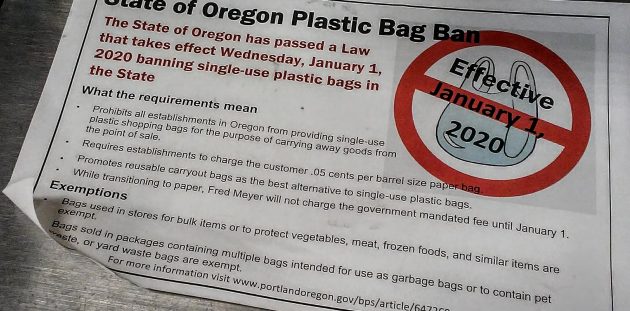
Fred Meyer in Albany, presumably like other stores around the state, has begun telling customers they have only a short time left in the Era of Convenient Shopping.
Signs like the one above appeared this week at Freddy’s self-checkout stations. At the same time, I got the impression that the ready supply of plastic shopping bags available at each station was markedly less.
This, of course, is the result of the legislature’s ban on stores giving customers plastic sacks to carry their stuff to their cars, and from their cars into the house. As everybody who reads the signs is reminded, the ban takes effect three weeks from now, on Jan. 1.
The Department of Environmental Quality, by the way, sent out a press release that has another name for this. The agency calls it the “Sustainable Shopping Initiative.” Of course, if this really was an initiative, people would have quit taking plastic bags from the store on their own. But that didn’t happen. Many of us have appreciated the convenience of getting those bags free, and we have various uses for them, giving the lie to the slogan “single-use plastic bag.”
Whether this change in the law on shopping bags will do anything for sustainability — whatever that means in this context — remains to be seen.
The legislature wants everybody to carry a reusable bag in case they feel a sudden urge to go to the store. Instead, what’s more likely is that shoppers will get paper sacks instead. Whether the manufacture of paper bags is any more environmentally benign than making bags of very thin plastic film remains to be seen.
The paper bags will cost not “.05 cents” as the Fred Meyer notice says but .05 dollars each. That’s 5 cents for people for whom decimal points are unfamiliar signs. Whether that price is enough to cause Oregonians to lay in and frequently renew a supply of reusable bags is something else we’ll have to wait to find out. (hh)

This ban is the supermarket version of low flow toilets – stupid government dictates that make our daily lives less comfortable and more miserable.
Instead of having a fake debate about the environment, why not have a real debate that addresses the following question:
Why shouldn’t a free and responsible citizenry voluntarily decide for themselves what grocery bags to use?
To answer your question, if we’re free to decide, we would not decide correctly. That s the purpose of government. To spend our monies correctly, since we can not be trusted (obviously) to do it on our own.
Not sure if you’re being facetious Proud Democrat, but if not, and your thesis is correct, it makes sense for “government” to take all our monies and spend it on our behalves in the “correct” way, but only of course after a certain portion of those monies are allocated to the personal use of those who are anointed to be the decision makers of what is or isn’t correct. No thank you.
Your question would be plausible if you believe the “and” connector. History has proven that wishful thinking at best, but a false hope nevertheless…
So we began using plastic bags to save the trees. Now we are using paper bags to save the environment. And we don’t throw our bags in the ocean anyway. These bureaucrats are such idiots.
Hey, M.Peterson
Try walking on one of our beautiful Oregon Coast beaches without seeing all the “plastic waste” washing ashore with each tide!
At least paper breaks down-plastic not so much! I see it everyday& it’s heartbreaking.
Jerry Berndt
Rockaway Beach, Oregon
A huge amount of the flimsy plastic bags do wind up in the oceans.
Hasso, in answer to your thinly-disguised, saracastic remark “not sure what sustainability is in this case,” or something like that, sustaining the life of this planet is what this is about.
Hemp is the easy answer, folks. Be kind, please.
Plastic bags (without handles) will still be in use in the produce and bulk sections, correct? So then what happens when someone grabs a few extra of those and puts their other groceries in them? Will they then need to keep more of those plastic bags in stock? Can I use plastic bags (with handles) I have in my home as reusable bags? Also, will they still be selling plastic garbage bags (with and without handles)? Is this just for grocery stores, or will department stores also be using paper sacks? Maybe the State of Oregon just doesn’t like plastic handles.
You will still be able to buy plastic bags and any Ziploc Plastic Products including plastic garbage bags. You’ll be amazed how easy it is to make the transition. Just came back from Hilton Head South Carolina where they banned plastic bags from there grocery stores because they have a beautiful environments and plastic was wreaking havoc on their beaches and city streets.
You should ask the citizens who help with the park and watershed cleanups before assuming that plastic bags do not pollute our soil and waterways.
https://www.opb.org/news/article/npr-are-plastic-bag-bans-garbage/?fbclid=IwAR2BbLju8Lh3Gkk7nqKOdUooC7qJGdYM7Zu9SgGMqDaouyU2oL4VxIeMXoQ
I reuse plastic bags for all kinds of things and will miss that bonus aspect of plastic bags on those occasions when I don’t bring a “reusable” bag with me. But I think what bugs me most about the bag ban is the illogical mandate that stores must sell something — paper sacks — that for years they happily provided for free.
Winco offers 6 cents back per bag if you remember to bring them when shopping. Not sure if other stores do this as well.
Did some math…. I average 5 bags per week. That’s 30 cents x 52 weeks equals $15.60 a year. x 8 years is $124.80. Adds up!
Now that is your look at the bright side.